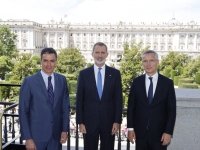Politics
Spain's accession to NATO was “a historic step"
40th anniversary of Spain's accession
USPA NEWS -
On Monday May 30, 2022, NATO Secretary General Jens Stoltenberg took part in the solemn ceremony marking the 40th anniversary of Spain’s accession to NATO. The ceremony took place in Madrid's Teatro Real, in the presence of the King Felipe VI and Prime Minister Pedro Sánchez, together with former NATO Secretaries General and former Spanish Prime Ministers. According the King, Spain's accession to NATO was “a historic step in our exemplary transition to a democratic and modern society, which allowed us to fully integrate into the European and Atlantic political sphere and, ultimately, the international one.”
Also, the King Felipe VI stressed that “unfortunately, the circumstances surrounding this anniversary are not what we would have wanted. The unacceptable Russian aggression against Ukraine reminds us, and it does so in a tragic way, of the enormous value in our lives of peace, security and democracy.” And Prime Minister Pedro Sánchez said that "belonging to NATO fulfills a transcendental mission: it allows us to be what we are, and guarantees that we will be what Spain wants to be. Because we are not just talking about a military alliance, but about a common front in defense of the principles that originate the prosperity and well-being of our peoples."
For its parte, Secretary General Stoltenberg emphasised that throughout the past four decades, Spain has stood united with its NATO Allies in maintaining security across the Euro-Atlantic area. He praised Spain’s contributions to the Alliance, including its key role in NATO missions and operations, and applauded Prime Minister Pedro Sánchez and the King Felipe VI for their personal leadership and commitment to NATO. The Secretary General recalled that Spain is currently “providing critical support for Ukraine with security assistance and humanitarian aid, to uphold Ukraine's right to self-defence enshrined in the UN Charter.”
In this regard, King Felipe VI stressed that Spanish participation in NATO missions over these 40 years has been an "extremely valuable commitment and a true honour." And he stressed that Spain will contribute to making the Alliance resulting from the Madrid Summit stronger, smarter, more efficient and better prepared to collectively face a new, more complex security environment.
Looking ahead to the NATO Summit in Madrid at the end of June, the Secretary General emphasised that the Summit will be “an important opportunity to reaffirm our commitment to NATO's values and the vital importance of Europe and North America working together in NATO.” He said that NATO will “reset our deterrence and defence for a more dangerous world” and will “deepen our cooperation with like-minded countries and organisations.”
The preparation of this Summit focused on the meeting that the NATO Secretary General and the Spanish Prime Minister previously held in the Moncloa Palace. During the Summit, the 30 allies will adopt the new NATO Strategic Concept, which will guide the organization's project for the next 10 years. Likewise, Sánchez and Stoltenberg, who had already held several work meetings over the weekend, discussed the applications for NATO membership by Sweden and Finland, which have the support of Spain. Both countries will attend the Summit invited by Spain. The contribution of Sweden and Finland "will have enormous value," according to the Spanish Prime Minister, Pedro Sánchez.
The last Strategic Concept of NATO dates from 2010, the date on which the guidelines that the Alliance would follow during the next decade were marked, in it three strategic lines were marked: collective defense, crisis management and cooperative security. For this reason, on this occasion the event acquires greater importance because it will be where the new NATO guidelines are defined, taking into account the current strategic context. The purpose of NATO is to guarantee the freedom and security of its member countries through political and military means.
Liability for this article lies with the author, who also holds the copyright. Editorial content from USPA may be quoted on other websites as long as the quote comprises no more than 5% of the entire text, is marked as such and the source is named (via hyperlink).






